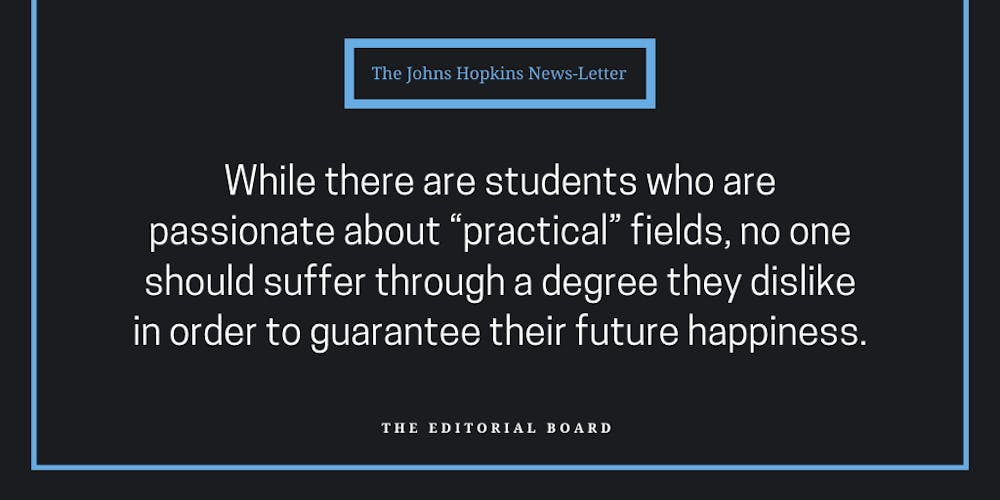Now that we are in the final stretch of the school year, freshmen are declaring their majors and considering their academic and career paths. In just a couple weeks, University offices will host workshops for freshmen to learn more about their declared majors and departments.
As first-years solidify their academic plans, there may be pressure to pursue “practical” majors that might guarantee financial security and career advancement. This reasoning stems from valid concerns: Like everyone studying at Hopkins, we are looking for a return on our investment. Though college education is expensive, it is a way to obtain better job opportunities and upward social mobility.
Often, this utilitarian mindset incentivizes one to choose a path in science, technology, engineering and mathematics (STEM). As the popularity of majors with more dependable job prospects, like computer science, has grown, colleges have seen a significant drop in the number of students graduating with degrees in the humanities. In fact, from 2012 to 2020, there was a 29.6% decline in the number of humanities college graduates.
As a STEM-heavy school, Hopkins isn’t spared from this national phenomenon. Among our student body, a common assumption is that humanities students are pursuing impractical and lofty dreams. In the past, humanities students at Hopkins have even written articles for The News-Letter defending their decision to major in something "fake" or pointing out the belittlement of humanities majors on campus.
This sentiment toward humanities students is also a frequent occurrence at our peer institutions. At Stanford University, for example, students are notoriously called either a “techie” (a STEM student) or a “fuzzy” (a humanities or social sciences student). Both terms carry negative stereotypes and pigeonhole students, but those categorized as “fuzzies” have to constantly defend the validity and relevance of their majors.
Just because humanities students primarily work with “soft skills” rather than “hard skills” does not mean that there is a weak return on investment. From practicing critical thinking to improving communication, humanities students are learning skills that are necessary and transferable in a myriad of professional fields.
Additionally, the value that humanities majors contribute to society is often overlooked. Though some have declared the English major is dying, its alumni are behind much of the media that consumes our free time. Have you ever watched Grey’s Anatomy or How to Get Away with Murder? Executive Producer Shonda Rhimes studied English at Dartmouth College. Are you a Marvel fan? The Russo brothers, who have directed box-office hits like Avengers: Endgame, both majored in English. Or maybe you have passed the time with a John Green novel; he studied literature at Kenyon College.
We won’t pretend all English majors will make millions like Rhimes or the Russos. Compared to their STEM-focused counterparts, humanities graduates do not make as much money straight out of college. However, the average salary of humanities students gradually catches up to their peers in STEM fields.
While there are students who are passionate about “practical” fields, no one should suffer through a degree they dislike in order to guarantee their future happiness. When college graduates were asked whether they were satisfied with their lives, about 90% said yes, regardless of their field of study.
We acknowledge that it’s a privilege to study what you love, and we don’t suggest throwing all of your economic concerns out the window. But for many of us, college is the last time in our lives we get to learn just for the sake of learning.
At a school like Hopkins where we have plenty of flexibility to add a second major or a minor, we urge students to seize the opportunity to take classes simply because they sound interesting. For some students, that might mean taking a class called Cancer Biology, and for others it may mean registering for Ancient Greek Mythology. Wherever our interests lie, we should use this unique chapter of our lives to explore them.





